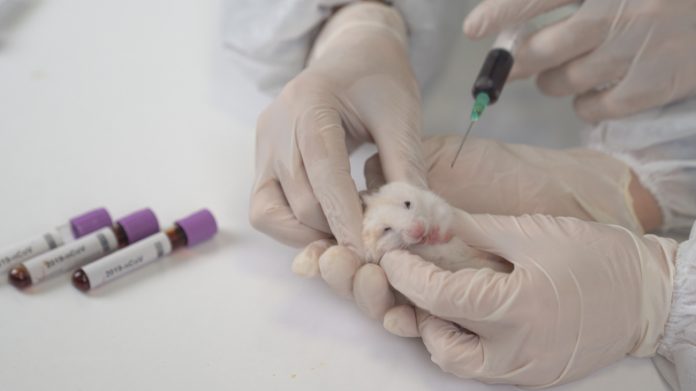Bipartisan legislation advancing in Congress would allow drug developers to use alternatives to animal testing.
The 1938 Food, Drug, and Cosmetics Act (FDCA) requires testing experimental drugs for toxicity in animals before conducting human clinical trials for safety and efficacy. Congress is considering a proposal that would allow the use of nonclinical tests or studies, including cell-based assays, organ chips, microphysiological systems, sophisticated computer modeling, and other human biology-based methods instead of animal tests.
U.S. Rep. Vern Buchanan (R-FL) introduced HR 2565, the FDA Modernization Act of 2021, in the U.S. House of Representatives. Buchanan’s one-page bill was attached to a larger bill (HR 7667) that was unanimously approved by the House Committee on Energy and Commerce on May 18.
‘Cutting Red Tape’
Millions of mice, rats, Guinea pigs, rabbits, cats, dogs, primates, and other animals have been killed in medical research.
Animal testing is unnecessary, cruel, and expensive, said Sen. Rand Paul (R-KY), an M.D., who introduced an identical bill (S 2952) in the Senate, in a statement.
“The FDA Modernization Act would accelerate innovation and get safer, more effective drugs to market more quickly by cutting red tape that is not supported by current science,” said Paul. “It would also prevent the needless suffering and death of animal test subjects—which is something I think both Republicans and Democrats agree needs to end.”
Animal testing is not always predictive of the effects of drugs on humans, said Gary K. Michelson, M.D., founder and co-chair of the Michelson Center for Public Policy, an advocacy group, in a statement.
“The most predictive technologies in existence should be available to drug sponsors to provide the safest and most effective medicines for patients,” said Michelson. “Animal data should not be the automatic reflex if there are superior non-animal test methods that predict what will happen in human clinical trials.”
‘Organ on a Chip’
David Gortler, Pharm.D., a policy advisor to The Heartland Institute, which co-publishes Health Care News, supported alternatives to animal testing while evaluating new drugs for approval at the U.S. Food and Drug Administration (FDA), states an article in Yale Medicine Magazine.
“While at the FDA, Gortler also advocated for reducing or eliminating the FDA’s requirements for animal testing in favor of brand-new, state-of-the-art OOC (human organ-on-a-chip technology, which uses microchips lined with human cells to model human disease states),” said the article.
New technology can reduce the long process of drug approval, Gortler told the publication.
“In addition to reducing harm to animals—a regrettable longtime necessity for scientific progress—this device promises to greatly speed up drug development and approval,” said Gortler. “It’s a win on both sides.”
The FDA remains institutionally averse to moving away from animal testing, Gortler told Health Care News.
“While at the FDA, I spent months preparing a detailed proposal that would test the hypothesis that OOCs would speed pre-clinical drug development by more accurately predicting drug safety and efficacy in humans,” said Gortler. “Comparative studies already show that OOC technology better predicts human drug responses than crude animal tests, but my scientific report was actively ignored by antagonistic and partisan bureaucrats.”
Hush, Puppies
Animals are also used in taxpayer-funded medical research, which has been a target of animal rights groups.
The White Coat Waste Project, which opposes animal testing, alleged beagle puppies were abused in research funded by the National Institute for Asthma and Infectious Disease (NIAID), headed by Dr. Anthony Fauci.
The group said the dogs’ vocal cords were cut so they didn’t bark, and federal legislators, including Paul, sent letters to Fauci demanding to know why healthy beagle puppies were “decorded,” and later euthanized.
“De-barking” is not an unusual or cruel practice, stated the NIAID, in an email to MedPageToday.
“Vocal cordectomies, conducted humanely under anesthesia, may be used in research facilities where numerous dogs are present,” the NIAID statement said. “This is to reduce noise, which is not only stressful to the animals but can also reach decibel levels that exceed OSHA allowable limits for people and can lead to hearing loss.”
Beagles were used in studies of a parasite that causes the tropical disease leishmaniasis, which is harbored by dogs and potentially fatal to humans, according to MedPageToday.
‘Require Animal Testing’
Animal testing is not only not unethical, but could be morally required, says H. Sterling Burnett, Ph.D., an environmental ethicist and senior fellow with The Heartland Institute.
“It may be cheaper, or more efficient to use models only, but from the ethical perspective of best ensuring there are no negative effects to human health, which should be the main goal of government involvement in product testing, it is legitimate to require animal testing,” said Burnett.
Policymakers should not let empathy elevate animals to the status of human beings, says Burnet.
“Animal suffering is a bad, but not a moral evil,” said Burnet. “Allowing preventable human illnesses or deaths from a new product in order to avoid animals suffering is both a bad and evil. It treats animals, which don’t have rights, as more important than humans, which do.”
In a free market, the government would not be responsible for testing drugs or cosmetics, says Burnett.
“A strict tort-based system would require full disclosure that not testing products on animals raises questions of both safety and sometimes efficacy, and that producers are willing to accept all liability for any resulting illnesses and death from the product or chemical’s use,” said Burnett. “But as long as the FDA is involved, I would argue it should require testing on animals.”
Bonner R. Cohen, Ph.D. (bcohen@nationalcenter.org) is a senior fellow at the National Center for Public Policy Research.
Internet info:
David Gorter, “Why Does the FDA’s CDER Director Insist on Cruel Animal Testing in Place f State-of-the-Art Alternative Technology,” PETA, January 2022: https://www.peta.org/blog/moral-progress-denied-by-fda-leadership-new-technology-could-have-allowed-the-agency-to-abandon-its-cruel-animal-testing-requirements/





















